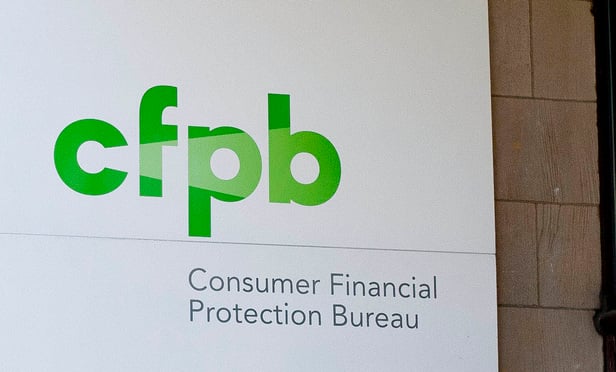On Sept. 8, a San Francisco federal judge refused to award the $74 million in restitution the CFPB wanted from Nationwide Biweekly Administration Inc. and its founder, Daniel Lipsky, over their allegedly deceptive marketing of a mortgage payment program. U.S. District Judge Richard Seeborg of the Northern District of California instead ordered them to pay a statutory penalty of $7.3 million.
The CFPB, Seeborg said, “has not proved that defendants engaged in the type of fraud commonly connoted by the well-worn phrase ‘snake oil salesmen.’”
A week later, on Sept. 13, a federal judge in Maryland dismissed the CFPB’s case against an attorney accused of aiding a scheme to scam victims of lead paint poisoning out of future settlement money. U.S. District Judge J. Frederick Motz of the District of Maryland found that the attorney, Charles Smith, qualified for a “practice of law exclusion, ” clearing him of the CFPB’s allegations.
In the Atlanta case, U.S. District Judge Richard Story of the Northern District of Georgia rebuked agency lawyers for what he called their “blatant disregard” to follow orders to state the factual basis to support claims against four payment processors and a telemarketing company. Story dismissed several charges in the CFPB’s case.
Story said the CFPB was obligated to sit for depositions and “needed to produce a witness prepared to apprise the defendants of the facts they would face at trial.” The agency, he said, “has put up as much opposition as possible at every turn. And in doing so, it has recycled many of the same arguments over and over.”
Those companies—represented by firms including Venable, Caplan Cobb and Lindquist & Vennum, among other firms—are now seeking legal fees from the CFPB. The companies have yet to specify a dollar figure for their fees request, and the CFPB’s case against the debt collectors themselves remains pending.
“The CFPB has done some good for consumers, but it has also pushed the limits and over-reached at points,” said Paul Hastings LLP of counsel Gerry Sachs, a former CFPB enforcement director who was previously an Atlanta-based assistant U.S. attorney. “Only time will tell how this impacts its future.”
The CFPB Is ‘Willing to Litigate’
Deepak Gupta, founding principal of Washington’s Gupta Wessler, cautioned against drawing broad conclusions from a few losses or adverse rulings. But, he said, such setbacks could signal that the CFPB is willing to test the limits of its ability to protect consumers.

“I think there is a school of thought that an enforcement agency should only bring cases where they have no chance of losing in court. One inference you can draw—it’s a good one as far as the CFPB goes—is that the CFPB is not part of that club. [CFPB Director] Richard Cordray is not part of the Chickenshit Club,” said Gupta, a former CFPB attorney, referring to a term James Comey, a former U.S. attorney in Manhattan, used to describe prosecutors too timid to bring cases that they fear they might lose. “They are willing to bring theories that haven’t been tested in court, and they’re willing to litigate them.”
Not all of the CFPB’s court setbacks have been so stinging. But the bureau’s attorneys have been brushed back.
This month in Minnesota, a federal judge cleaved two of four counts out of a case the CFPB brought against TCF National Bank. The CFPB alleged that, by tricking consumers into signing up for overdraft services, the bank violated not only the Consumer Financial Protection Act’s prohibition against “unfair, deceptive or abusive acts or practices” but also a regulation that requires banks to obtain “affirmative consent” from consumers for those services.
U.S. District Judge Paul Magnuson of the District of Minnesota dismissed the bureau’s allegations that TCF National Bank—represented by lawyers from Williams & Connolly, Buckley Sandler and Dykema Gossett—committed technical violations of the opt-in regulation. He said the CFPB’s complaint “nowhere suggests that TCF failed to obtain new customers’ consent to overdraft services.”
“Instead, the bureau’s contention is that consumers failed to ‘affirmatively consent’ because they did not understand what they were agreeing to, as a result of TCF’s so-called misleading conduct,” Magnuson wrote. “This is fatal.”
Still, Magnuson kept alive the allegations brought under the CFPB’s authority to police deceptive and abusive practices—a broad enforcement power that Republican lawmakers have proposed rescinding. And he easily rejected TCF’s argument that the CFPB is unconstitutionally structured. “The court need not linger long on this argument,” he wrote, pointing to other court decisions that upheld the lawfulness of the single-director scheme.
The CFPB this summer faced a similar struggle in its case against a Kentucky law firm, in which the bureau alleged violations of regulations around real estate closings. In that case, the CFPB alleged that the Louisville-based Borders & Borders ran a web of shell companies to disguise improper kickbacks for client referrals as legitimate profit-sharing.
Dismissing the case, U.S. District Judge Charles Simpson III of the Western District of Kentucky said the law firm Borders & Borders qualified for a safe harbor provision in the Real Estate Settlement Procedures Act that shelters “affiliated business arrangements,” so long as those arrangements are disclosed to the consumer being referred to the partner company.
“Given that Borders & Borders disclosed the relationship with the [joint ventures], the customers could reject the referral, and the bureau failed to show that the [joint ventures] received anything of value beyond their ownership interests, there is no genuine dispute of material fact that the ['joint ventures’] arrangement with Borders & Borders qualifies as an affiliated business relationship protected” under RESPA, Simpson wrote, “and Borders & Borders is entitled to summary judgment as a matter of law.”
In another case, the CFPB retreated before it reached the point of bringing an enforcement action.
This content has been archived. It is available through our partners, LexisNexis® and Bloomberg Law.
To view this content, please continue to their sites.
Not a Lexis Subscriber?
Subscribe Now
Not a Bloomberg Law Subscriber?
Subscribe Now
LexisNexis® and Bloomberg Law are third party online distributors of the broad collection of current and archived versions of ALM's legal news publications. LexisNexis® and Bloomberg Law customers are able to access and use ALM's content, including content from the National Law Journal, The American Lawyer, Legaltech News, The New York Law Journal, and Corporate Counsel, as well as other sources of legal information.
For questions call 1-877-256-2472 or contact us at [email protected]





